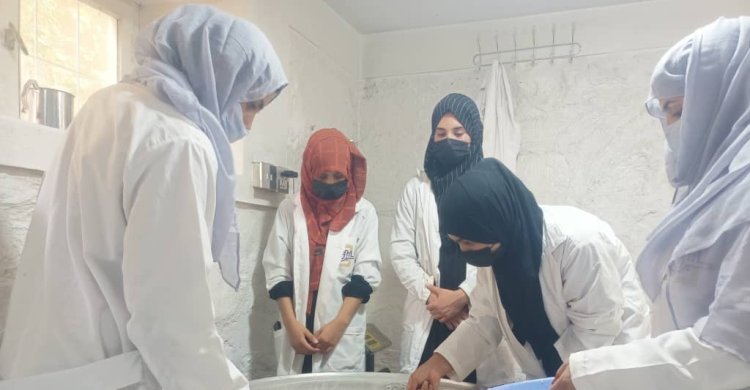Afghan Female Doctors Complain of Low Salaries and Taliban Interference

In several provinces, a number of female doctors have complained about the Taliban’s direct interference in their work. They say that officials from the Ministry for the Promotion of Virtue and Prevention of Vice stand at hospital gates every day, harassing women for not having a male guardian or for what they call “improper hijab.” According to these doctors, many women have been forced to quit their jobs as a result.
Several female doctors from different provinces spoke to R.M. Media, describing pressures, reduced salaries, shortages of medical supplies, and direct interference by the Taliban in hospital operations.
Sahra (a pseudonym), a 35-year-old gynecologist and obstetrician in Nangarhar province, is among the few women still working in a government hospital.
She said:
“Every day, the Amr bil Maroof officials are stationed at the hospital gate. They harass and threaten female doctors for not wearing the hijab properly or for coming to work without a male guardian. This happens daily, and they also interfere in our professional duties.”
Dr. Sahra, who has around eight years of experience, said that the Taliban have ordered all female doctors not to come to work without a male guardian and that the presence of a mahram is mandatory inside the hospital.
“My son takes me to the hospital every morning. But many women who have no male relatives at home have been dismissed, and men have taken their positions.”
She added that since the Taliban’s return to power, the workload has increased dramatically while salaries have been cut:
“My salary was reduced from 25,000 Afghanis to 13,000. I can no longer even pay for my four children’s school fees. Many of my colleagues were dismissed because they didn’t have a mahram. So now we have more work, less pay, and higher living costs.”
In Kabul, Dr. Nafisa Sahak (also a pseudonym), who is the sole breadwinner for her family, has worked for several years in the women’s ward of Maiwand Hospital. She says that a lack of medical supplies, shortages of essential medicines, and constant Taliban interference have made her job increasingly difficult.
According to her, the shortage of medical staff has become a serious issue. Since the collapse of the previous government, half of her colleagues have left the country, and no new female doctors have been hired to replace them.
“Salaries have been reduced and are often paid late. On top of that, very few female doctors remain. Most have either migrated to Europe or resigned due to Taliban pressure.”
Dr. Nafisa also said the Taliban enter the maternity and gynecology wards without permission and interfere with medical work:
“Taliban members walk into the men’s and women’s sections of the hospital without authorization, even though they are not allowed to do so.”
She further complained about the daily presence of the Amr Bil Maroof, who monitor women’s hijab:
“If a female doctor’s hijab isn’t exactly as they want it, they mark her absent and issue warnings that she’ll be fired if it happens again. Women are forced to obey whatever the Taliban say, and many have developed psychological problems because of this constant pressure.”
Since the Taliban took power in Afghanistan, most women who worked in government or non-government institutions have been sent home. Although a few female doctors still work in the healthcare sector, they are operating under severe restrictions.
In addition, the Taliban has closed universities to women and banned them from attending medical institutes — a move that has raised serious concerns about the future of women in Afghanistan’s healthcare system.
Last month, the World Health Organization (WHO) reported that Afghanistan’s healthcare system — already weakened by years of crisis and widespread poverty — now faces acute shortages of medicine and medical personnel, especially female staff. The organization emphasized that restrictions on women have severely limited their access to healthcare services, leaving women and children as the most affected groups.
